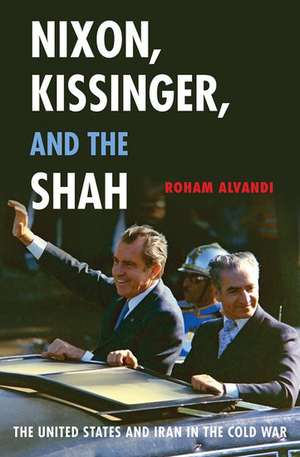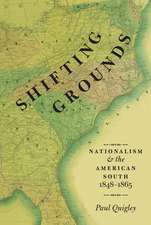Nixon, Kissinger, and the Shah: The United States and Iran in the Cold War
Autor Roham Alvandien Limba Engleză Paperback – 8 dec 2016
| Toate formatele și edițiile | Preț | Express |
|---|---|---|
| Paperback (1) | 228.92 lei 31-37 zile | |
| Oxford University Press – 8 dec 2016 | 228.92 lei 31-37 zile | |
| Hardback (1) | 562.79 lei 31-37 zile | |
| Oxford University Press – 5 iun 2014 | 562.79 lei 31-37 zile |
Preț: 228.92 lei
Preț vechi: 258.35 lei
-11% Nou
Puncte Express: 343
Preț estimativ în valută:
43.80€ • 45.86$ • 36.24£
43.80€ • 45.86$ • 36.24£
Carte tipărită la comandă
Livrare economică 25-31 martie
Preluare comenzi: 021 569.72.76
Specificații
ISBN-13: 9780190610685
ISBN-10: 0190610689
Pagini: 272
Ilustrații: 12 illus.
Dimensiuni: 155 x 231 x 15 mm
Greutate: 0.39 kg
Editura: Oxford University Press
Colecția OUP USA
Locul publicării:New York, United States
ISBN-10: 0190610689
Pagini: 272
Ilustrații: 12 illus.
Dimensiuni: 155 x 231 x 15 mm
Greutate: 0.39 kg
Editura: Oxford University Press
Colecția OUP USA
Locul publicării:New York, United States
Recenzii
In Nixon, Kissinger, and the Shah Roham Alvandi examines the intimate relationship that developed among three 1970s cold warriors: President Richard M. Nixon, Henry Kissinger, and Iranian shah Mohammad Reza Pahlavi.... [Alvandi] provides a unique case study of the power of individual leaders and the strength of such relationships in international relations, as well as the consequences - good or bad - of forming policy without the scrutiny of government agencies or public opinion.
Roham Alvandi...has given us a beautifully written and thoroughly researched account of the 'special relationship' between the Nixon Administration and the Shah during the early 1970s...
[An] enlightening new book [that] offers a timely revisionist approach to one of the most misunderstood bilateral relationships of modern times... As scholars continue to sift through the archives, this book and others like it are challenging conventional thinking by offering a more rounded and mature discussion of U.S.-Iran relations under the last shah.
Knowledge of the 1970s, when Mohammad Reza Pahlavi was one of Washington's closest global allies, is essential for anyone wishing to understand why it is so difficult for the US and Iran to overcome their differences. Alvandi throws new light on the period by showing that Iran's last shah was more than just President Richard Nixon's cat's paw in the Middle East.
Dispensing with older historiographies that denude Middle Eastern leaders of individual agency, Alvandi's contribution breathes life into great-man history and the power of personality... [A] well-written account of personality-driven politics against the backdrop of the Cold War. Alvandi's book surveys a broad swath of time and place. But the power of this volume remains centered in its story: the promise and plight of nations as a result of the men who led them.
This is an important and ground-breaking book on an often misunderstood period in Middle East history and U.S.-Iran relations. Roham Alvandi draws on fresh historical sources to provide an incisive corrective in his in-depth look into how the United States and Iran formulated foreign policy and forged a partnership to manage the Middle East. This is a book of direct relevance to Iran's role in the Middle East today, and to how U.S.-Iran relations may once again influence regional politics. This is must reading for anyone interested in contemporary Iranian history, and in particular in U.S.-Iran relations.
Roham Alvandi's book provides a provocative and eloquently written account about a crucial period in the highly volatile relationship between the United States and Iran. Crucial reading for anyone wishing to understand the roots of America's current policy in the Middle East.
This important book confirms Roham Alvandi's status as one of the new generation's leading scholars of Iran. His meticulous research and original analysis provide the clearest picture yet of a historic turning point for the country that helped lead it down the path to revolution. He breaks new ground on topics of enduring relevance-including Iran's regional policies and nuclear ambitions-and offers myth-dispelling assessments of the Shah and his erstwhile U.S. patrons. Finally, his conclusions present a salutary test of conventional Cold War formulations, particularly regarding the role of the Third World.
Nixon, Kissinger, and the Shah is a fine example of just how much work can be done even while archives remain closed. As more works like it appear in coming years, our understanding of the truly global nature of the Cold War is certain to improve."-Paul Thomas Chamberlin, Cold War History
Roham Alvandi...has given us a beautifully written and thoroughly researched account of the 'special relationship' between the Nixon Administration and the Shah during the early 1970s...
[An] enlightening new book [that] offers a timely revisionist approach to one of the most misunderstood bilateral relationships of modern times... As scholars continue to sift through the archives, this book and others like it are challenging conventional thinking by offering a more rounded and mature discussion of U.S.-Iran relations under the last shah.
Knowledge of the 1970s, when Mohammad Reza Pahlavi was one of Washington's closest global allies, is essential for anyone wishing to understand why it is so difficult for the US and Iran to overcome their differences. Alvandi throws new light on the period by showing that Iran's last shah was more than just President Richard Nixon's cat's paw in the Middle East.
Dispensing with older historiographies that denude Middle Eastern leaders of individual agency, Alvandi's contribution breathes life into great-man history and the power of personality... [A] well-written account of personality-driven politics against the backdrop of the Cold War. Alvandi's book surveys a broad swath of time and place. But the power of this volume remains centered in its story: the promise and plight of nations as a result of the men who led them.
This is an important and ground-breaking book on an often misunderstood period in Middle East history and U.S.-Iran relations. Roham Alvandi draws on fresh historical sources to provide an incisive corrective in his in-depth look into how the United States and Iran formulated foreign policy and forged a partnership to manage the Middle East. This is a book of direct relevance to Iran's role in the Middle East today, and to how U.S.-Iran relations may once again influence regional politics. This is must reading for anyone interested in contemporary Iranian history, and in particular in U.S.-Iran relations.
Roham Alvandi's book provides a provocative and eloquently written account about a crucial period in the highly volatile relationship between the United States and Iran. Crucial reading for anyone wishing to understand the roots of America's current policy in the Middle East.
This important book confirms Roham Alvandi's status as one of the new generation's leading scholars of Iran. His meticulous research and original analysis provide the clearest picture yet of a historic turning point for the country that helped lead it down the path to revolution. He breaks new ground on topics of enduring relevance-including Iran's regional policies and nuclear ambitions-and offers myth-dispelling assessments of the Shah and his erstwhile U.S. patrons. Finally, his conclusions present a salutary test of conventional Cold War formulations, particularly regarding the role of the Third World.
Nixon, Kissinger, and the Shah is a fine example of just how much work can be done even while archives remain closed. As more works like it appear in coming years, our understanding of the truly global nature of the Cold War is certain to improve."-Paul Thomas Chamberlin, Cold War History
Notă biografică
Roham Alvandi is Assistant Professor of International History at the London School of Economics and Political Science.












